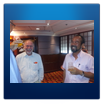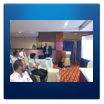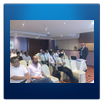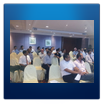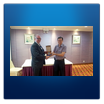rest hours
35 members and guests of the Hong Kong branch gathered in September to hear NI Technical Manager Capt. Harry Gale speak about compliance with seafarers’ work and rest legislation.
Capt. Gale began by outlining the NI response to the issue in recent years. The need for extra manning to run ships safely and prevent fatigue was highlighted as long ago as 2006 by our own committee member Arthur Bowring, in an article he wrote for Alert, while a President’s questionnaire revealed that manning and fatigue were issues of great concern to the membership. This led to the subject being included as a core component of the Institute’s strategic plan for 2011-15.
In the meantime, the Institute has been particularly vocal in highlighting the dangers of manning on feeder ships in northern Europe, where a Master and Mate often keep six-hour watches while visiting multiple ports on a very tight schedule. They are preparing a paper to be presented at the IMO next year, and input is needed from the branches and from members who have experience of the system.
The speaker pointed out the findings of Project Horizon, an academic study which put real seafarers into different watchkeeping systems and analysed the resulting fatigue. The six-on, six-off system was clearly the most likely to cause fatigue, particularly in busy waters or when sleep was interrupted by frequent arrivals and departures.
This is not news, of course. A 2004 study by the MAIB into the causes of accidents cited fatigue as a major factor in groundings. They found that one third of all groundings happened when a tired officer was alone on the bridge at night, and 90% of groundings happened to ships with only two watchkeeping deck officers.
People are poor judges of their own fatigue so other industries, notably aviation, have good prediction tools. When the six-on, six-off routine is run through an airline prediction programme, the officers go into the red zone in just over a week even if nothing untoward happens to disrupt their expected time off. Pilots will not hesitate to stop work when they reach the limit of their permitted hours, even if it means flights are delayed and passengers inconvenienced, but there is no such system in the shipping industry and most officers would rather cut out their own spleens than delay their vessel. This may have to change in future.
Capt. Gale pointed out that many reputable owners are starting to move away from the requirements of the Minimum Safe Manning certificate and are putting extra officers on board, even though it puts them at a commercial disadvantage. He concluded by drawing members’ attention to the NI fatigue forum, and pointed out that we are lucky there has not yet been a major disaster due to officers falling asleep.
The talk was followed by a lively question and answer session, which covered methods of recording rest time, possible exemptions, the difficulty of paying extra overtime in future when crews are doing jobs like hold cleaning, and the probability of different administrations having different interpretations of the new rules. One member pointed out that Masters who formerly kept an eye on inexperienced watchkeepers in heavy traffic may not be able to do so in future for fear of exceeding their hours, which could lead to serious accidents.
On this sombre note we adjourned to the buffet, where the discussion continued.


